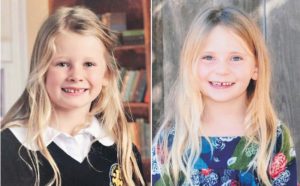
Friday, December 29, 2017 ~ EDITORIAL ~ by Mary P Brooke: Complex social forces, deadly consequences
So much more sad that it happened on Christmas Day, but by any measure a tragedy… two young girls were murdered by their own father in upscale Oak Bay. Around Greater Victoria there is shock and sadness this week at the human pain of it all. Friends rally around the mother who has lost her children in this brutal manner and who will no doubt eventually face her husband in court and the demons of their marriage in her soul. So much more sad that it happened on Christmas Day, but by any measure a tragedy… two young girls were murdered by their own father in upscale Oak Bay. Around Greater Victoria there is shock and sadness this week at the human pain of it all. Friends rally around the mother who has lost her children in this brutal manner and who will no doubt eventually face her husband in court and the demons of their marriage in her soul.
To get some proactive perspective let’s go into some sociological academics, wherein lies the study of ‘crime and deviance’. If you know your basic principles of statistics, on a bell curve of social behaviours there are most people in the middle, with a dwindling number toward the bottom, ending with a few stragglers at the fringes. Remember that ‘deviance’ and ‘fringe’ is on the brilliant positive side that impresses us (winners who are ultra-successful in business, politics and the arts) as well as at the criminality end that horrifies us (horrendous depravity and crimes that exceed all reason). It’s when people try to find their place in the middle but there’s ‘no room at the inn’ so to speak, that they find themselves climbing up the shiny side of the bell curve of life or crawling down the dark and sticky side.
A myriad of factors will impact a person’s choices to excel and impress versus degenerate and disappoint, not the least of which are one’s own DNA, physical and mental well-being, level of education, moral and ethical standards, cultural expectations, job opportunity, financial status, stability of social network (or lack thereof), and the simple availability of life opportunity and the variable levels of means to accomplish one’s goals.
We can be horrified and shake our heads over hearing that a financially distressed and emotionally distraught father would kill his own children. What are the forces that pressure a person to this? Apparently there was a custody battle and financial distress, but where did some of that come from? In part from a social system that favoured the economic gain of some over others, and for whatever reason one party to the scenario not being able to keep up.
Repeated loss is a powerful force… was this a man who lost his wife, saw his marriage fall apart, would lose custody of his children, and became financially drained for keeping up to a child support standard set by the assumptions and standards of society and the court? Take away too much from a person — especially in a compact period of time or over a longer but sustained series of hits and who knows if or how they will snap. The fullest possible picture of sociological impacts are hopefully examined in any tragedy that at first seems to have a clear-cut politically correct context.
When a person determines that they have no other options, they can be seen to choose the unthinkable extremes such as convoluted theft, sudden suicide or grisly murder. As a society we must continue to strengthen the options that are available to individuals in their familial and financial situations. As Oak Bay Acting Mayor Hazel Braithwaite pondered in a media interview this week… what triggers can be taken care of for people so that things don’t get to a point of sheer distress.
Open-mindedness, reassessment of what is financially fair, and seeing each person for the wholeness of their being will go a long way beyond the cut-and-dried legal and tax system that puts property above all else and still operates on assumptions about how partners in a marriage or common law relationship presumably contribute to the combined situation.
Creating winners is grand — as a society we celebrate our exceptional leaders and brightest celebrities (though we make examples of them, which comes with its own pressures). Under pressures to succeed (and to whose standards, we could ask), some stumble and fall on their way to the top. On the other side of the bell curve are those who are pushed into becoming the losers of modern society (a process not immune to the application of racism, sexism, ageism and nationalism), and usually with ample punishment for their apparent fate. Win or lose, the outcomes are not all as superficially perceived.
Society as a whole is complicit in the results of both extremes. Meanwhile, most of us just watch from afar and quietly whisper how thankful we are to be somewhere in the middle.
Hopefully it becomes increasingly apparent that it’s an overall societal responsibility to consciously and conscientiously shape the future for all sectors of the community. That needs to be done with special attention to both financial stability and social inclusion, thus easing the traumas of socioeconomic transitions that might arrive in a person’s life.
***
Back to Editorials page

